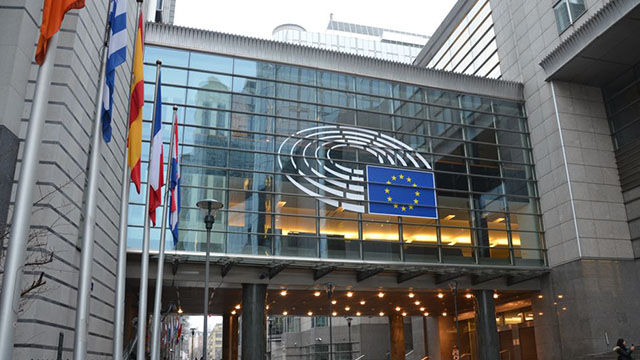The day after Uyghur dissident Ilham Tohti received the 2019 Sakharov Prize, the European Parliament passed a resolution telling China that camps should be closed.
by Marco Respinti

China repeats it time and again: the ill-famed transformation through education camps in Xinjiang are just “vocational training centers” and “professional schools.” But an important international institution such as the European Parliament doesn’t buy this lie. It calls those facilities what they are: “re-education camps,” where victims are imprisoned and indoctrinated by the CCP. Their aim is to change their life and identity, and “sinicize” them, i.e. make them into good Communists.
For those who want to know the reality of Xinjiang, tons of materials have been available for months, including leaked documents, testimonies, pictures, and videos. Some of them have been published by Bitter Winter since we started our magazine in early May 2018. Scholars now believe that camps in Xinjiang detain up to three million people, most of them guilty just of practicing Islam and belonging to a non-Han ethnic group. They are in fact Uyghurs, and have their own distinctive language, culture, and tradition. Other thousands of Turkic citizens, mostly Muslim as well, share the same fate in the same camps. The camps also detain members of other religious minorities, such as The Church of Almighty God.
Sadly, though, many in the world still choose to believe the fake news fabricated by the CCP, according to which all these people are “terrorists.” However, during the plenary session that the European Parliament held on December 19 in Strasbourg, France, MEPs passed a resolution expressing “serious concern about China’s repression of the Uyghurs,” and calling on “the Chinese government to close the ‘re-education camps’ in Xinjiang immediately” and to “unconditionally release all detained persons.”
This strong condemnation points at China’s “system of predictive policing,” “practice of arbitrary detentions without any charge, trial or conviction for criminal offence,” as well as “torture, egregious restrictions on religious practice and extensive digitized surveillance.” In fact, MEPs “call on the Chinese authorities to give independent journalists and international observers free access to Xinjiang province to examine the situation on the ground.”
Another reason for serious concern, MEPs say, regards “reports about Uyghurs abroad being harassed by the Chinese authorities in order to compel them to inform against other Uyghurs, return to Xinjiang or remain silent about the situation there, sometimes by detaining their family members.”
MEPs know that tools used so far by the EU have not led to tangible progress in China’s human rights record, which has only deteriorated during the last decade. They call on “the [European] Council to adopt targeted sanctions and freeze assets, if deemed appropriate and effective, against the Chinese officials responsible for severe repression of basic rights in Xinjiang.”
This remarkable resolution came during the same plenary session which awarded Mr. Ilham Tohti the 2019 Sakharov Prize. Mr. Tohti is a well-known peace-loving Uyghur intellectual, who was never involved in activities promoting separatism or terrorism. Since he denounced the cultural genocide perpetrated by the CCP in Xinjiang, he went to jail nonetheless. While his daughter, Ms. Jewher Ilham, accepted the Prize in his name in Strasbourg on December 18, MEPs were already at work to draft and pass the following day one of the most important resolutions on the subject internationally.
Some of the Chinese lies have thus been exposed. We hope other Parliaments and institutions will follow suit, and denounce the persecution in China not only of Islam but of all religions—Protestant house churches, dissident Catholic priests, Falun Gong practitioners, Buddhists, Taoists, members of The Church of Almighty God and other movements banned as xie jiao.
Source: Bitter Winter












